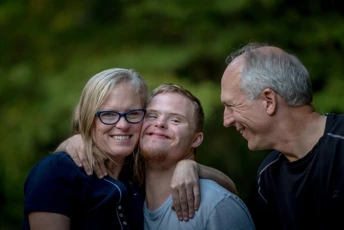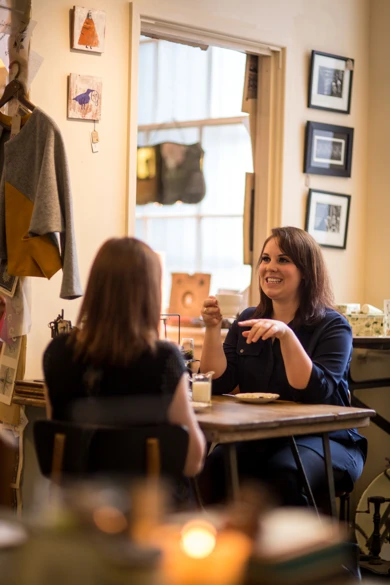 Written by: Danny Belton - Head of Lending
Written by: Danny Belton - Head of Lending
Saving a deposit for a house is one of the biggest hurdles for buying a house, so it's no surprise that gifted deposits are a common feature of buying a home. Find out what gifted deposits are, how they work and the legal and tax implications
In this article:
Can you use a gifted deposit as a first time buyer?
What are the different types of gifted deposit?
How can you prove the source of a gifted deposit?
How much can I borrow with my gifted deposit?
Checklist of the legal implications of gifting a deposit
What happens if the gift giver dies - is inheritance tax due?
What is a gifted deposit?
Let’s start with the basics and discuss what a gifted house deposit is.
Simply put, a gifted deposit is when family members give you money towards your deposit. They can give as much or as little as they would like, but be aware of potential inheritance tax.
A deposit is usually at least 10% of a mortgage. With a property costing £240,000, this means you’ll need to have at least £24,000 ready to pay your deposit. A gift can help a lot towards this.
A gifted deposit means you’ve been given money towards, or to fully cover, your deposit amount. This is not a loan, nor does the person giving you the money have any stake in your property. The money must be given freely, with no requirement or expectation of repayment at any time in the future.
Can you use a gifted deposit as a first time buyer?
Absolutely! In fact, according to 2024 first time buyer data from Uswitch, 37% of the UK's first time buyers paid their deposit using a gifted deposit from their family. There are a few things to keep in mind though:
- The deposit needs to be a genuine gift with no expectation of repayment
- Some lenders may have restrictions on who can gift you the money. For example, some prefer it to come from a close family member
- You'll need to able to provide proof of the gift, such as a signed letter from the gift giver stating it's a non repayable gift, showing where the funds have come from
Speak to our mortgage advisers about your situation. We'll can help you find the right lender that accepts your gifted deposit.
What are the different types of gifted deposit?
There aren't different types of gifted deposits, as it is simply money given to you (usually by a family member) to contribute towards a deposit for a house, without the obligation of paying it back.
If the family member did want the money to be repaid eventually, it is no longer classed as a gifted deposit, and instead it is simply a loan. This will need to be declared to your mortgage adviser and lender as it means that the person loaning the money would have a legal interest in the property being purchased.
How can you prove the source of a gifted deposit?
When declaring a gifted deposit to your mortgage lender and adviser, you may be required to provide a gifted deposit letter. This document essentially proves that the person giving the gifted deposit will not be expecting to be repaid. This letter will require the following information:
- Your name
- Source of the money
- Relationship to the person giving the gift
- Amount
- Confirmation that the person is not expecting to be repaid
- Confirmation that they won't be receiving any equity in the property
- Evidence that the gift giver can afford it
How much can I borrow with my gifted deposit?
If you've been gifted a deposit amount, use that figure along with any other deposit amount, in our borrowing calculator to get an idea of how much you could borrow.
Borrowing Amount Calculator
Now that you know how much money you could borrow, you'll probably want to know how much this will cost you each month?
Start your mortgage search today and find out what your monthly repayments could be.
Checklist of the legal implications of gifting a deposit
No repayment is expected for a gift, and this needs to be declared. Your mortgage adviser, lender, and conveyancer will require a gifted deposit letter signed by the donor, stating:
✔ Their name and yours
✔ The amount gifted
✔ Confirmation it's a gift with no expectation of repayment or stake in the property
✔ A statement that the gift has no commercial interest
✔ Confirmation that the gift giver is financially solvent and in a position to provide the gift.
Get the paperwork in order
The donor will likely need to provide proof of ID and source of funds, like bank statements showing the origin of the money. You will also need confirmation that the money is clean and legal, potentially involving additional checks.
Be transparent with your mortgage adviser
Inform your adviser and lender early on about the gifted deposit. Different lenders have varying standards and restrictions around gifted deposits, so it’s important to be transparent. Be prepared to answer questions about the source of the gift and your relationship with the donor.
Consider tax implications
While unlikely, there could be potential Inheritance Tax implications depending on the amount gifted and the donor's circumstances. At Mortgage Advice Bureau, we do not give tax advice, and so speaking to a solicitor would be the best course of action.
What happens if the gift giver dies - is inheritance tax due?
If you’re accepting a lump sum gift as a type of ‘living inheritance’ from an older relative, there’s a few things you need to be aware of. If they die within seven years of providing you the gift, the estate may have to pay inheritance tax on it. Of course, this risk lies with a gift provided by someone of any age, but statistically older people are more likely to pass away during the seven-year inheritance tax period.
They also cannot be seen to be ‘depriving themselves of capital’. For example, if by giving you the gift, they would then qualify for certain state benefits, this could cause significant complications.
By following these steps and seeking professional advice where needed, you can ensure your gifted deposit helps you achieve your homeownership goals smoothly and securely.
Frequently asked questions
Most lenders will accept a gifted house deposit, but some won't. There are some limits on who can gift a deposit, and lenders will need to check you meet their rules.
A lot of lenders prefer gifted deposits that come from a close relative. If you are considering using a gifted deposit, it is always best to check with the lender first to see if they will accept it. Our advisers will be able to source mortgages with lenders that will accept your deposit.
A gifted deposit can positively affect your mortgage deal. A larger deposit can improve your loan-to-value and also boost the likelihood of having your application accepted (as you have a larger deposit than you would have without the gift).
Yes, it is becoming more common that a parent or relative help with a first time buyers deposit. As long as you clarify that you do not want to be repaid and will have no stake in the property.
Anyone, as long as the lender is happy with the source of the deposit. There are some limits on who can gift a deposit, and lenders will need to check you meet their rules.
A lot of lenders prefer gifted deposits that come from a close relative. Our advisers will be able to source mortgages with lenders that will accept your deposit.
Most lenders ask for a minimum of 5% for deposit. For many, this can present something of an unrealistic goal, as saving large sums of money can take years.
However, there has been a gradual increase in the number of products available that require little or no deposit, making buying a house a more accessible goal. Find out more about the low or no deposit options available, examining the benefits and drawbacks of these types of mortgages, and whether they may be right for you.
Yes, multiple gifts can boost your mortgage deposit. Remember to provide details about each source. You'll need separate gifted deposit letter for each one.
Speak to an expert mortgage adviser
Important information
Your home may be repossessed if you do not keep up repayments on your mortgage.
There may be a fee for mortgage advice. The actual amount you pay will depend on your circumstances. The fee is up to 1% but a typical fee is 0.3% of the amount borrowed.
Related Articles
Using our MyMAB app to track your savings
Life is proving expensive right now, and we’re all trying to tighten our pursestrings wherever we can. That’s where the MyMAB app comes in.
Understanding your credit score
If you were in a position where someone was asking you for a large amount of money, you’d want to know they were in a good place to pay it back, right? That’s the position the lenders are in.
First time buyers rely on the Bank of Mum and Dad more than ever before
The Bank of Mum and Dad is once again a very popular choice for many desperate first time buyers trying to get on the property ladder.
How to help your children get onto the property ladder
Are your children struggling to get a foot on the property ladder? Understand how you can help them to take the next step towards owning their own home.
5 advantages of owning your own home
Buying your first home is a really exciting time and comes with many perks.
A helpful guide for first time buyers
First time buyers complete guide to buying your first home.
No posts currently available
Sign up to our monthly newsletter
Stay up-to-date with all the latest mortgage news and homebuying tips with our monthly newsletter. Jam-packed with helpful information and advice, you'll always know what's happening in the industry and how it might affect you.
Whether you're a first time buyer or getting ready to remortgage, we're here for you with helpful tools, articles and information delivered straight to your inbox.







